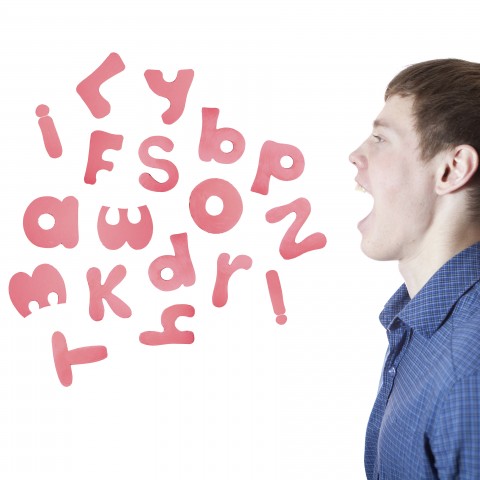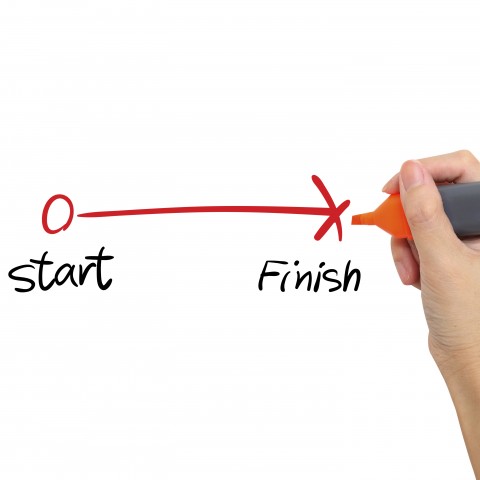
Congratulations! You’ve reached the intermediate level in Czech and are now ready to learn some intermediate Czech vocabulary. I bet you feel great about this accomplishment.
Let me tell you, this is way bigger than it looks. Not a lot of people actually stick with it and keep their motivation high. That means you should give yourself a pat on the back—you’re above average, super committed, and on your way up to fluency.
We have an expression in Czech (it’s actually a compound noun): Věčný začátečník / “The perpetual beginner.” Since you’re reading this article, it’s plain as day that you’re far beyond those murky waters and sticky mud.
According to the Foreign Service Institute, Czech is a Level III language, which means it takes 44 weeks or 1100 hours to get past the basics and reach the intermediate (conversational) level. You made it!
I hope you popped a bottle of champagne (or at least bragged to your friends on Messenger). Now, let’s get back to work, my friend.
It’s well known among avid language students that once you reach the coveted intermediate level, things slow down. Your progress isn’t nearly as linear and fast as it was at the beginning. Please don’t get discouraged. The path from intermediate to fluency is pretty steep and slippery, but once you get there, your legs (and your language skills) will be much stronger.
How do I know? Been there, done that. Twice. Speaking from my personal experience here, I recommend you take it easy; throw away your expectations and sky-high standards. Focus on progress, not speed or perfection.
The intermediate level is where the magic happens:
- Your vocabulary unfolds like a beautiful flower.
- You build complex sentences effortlessly and naturally.
- You might even start to think and dream in Czech, too!
- You notice that you often understand new words just based on the context.
- You inadvertently overhear many Czech conversations. (Let’s hope you won’t wish you could unhear them.)
In this article, you’ll find 300 intermediate Czech words that will help you get to the next level. Let us know in the comments if you knew any of these words already, or if they’re all new to you!

Practice makes perfect.
 Table of Contents
Table of Contents
- Larger Numbers
- One Intermediate Noun is Worth More Than 1000 Filler Words: Nouns
- Limitless Action: Intermediate Czech Verbs
- Adjectives: Make Your Czech Lively and Juicy
- Dangerously Necessary: Intermediate Czech Adverbs
- Tiny but Important: Intermediate Czech Prepositions
- No Sentence is Complete without Them: Conjunctions
- How CzechClass101.com Helps You Learn Czech in a Fun Wa
1. Larger Numbers
First up on our intermediate Czech wordlist: numbers!
Counting in Czech is an amazing skill that will come in handy time and again. (Třicet korun, prosím. – “Thirty crowns, please.”) It’ll allow you to count sheep in Czech on one of those sleepless nights, too.
For those of you who find it hard to do even the simplest math equations or memorize numbers in a foreign language (this is actually very common), try to practice numbers daily:
- ➢ Whenever you see/hear a number in your first language, try to translate it into Czech. It’s a fun little game that makes learning figures (and actually remembering them) much easier.
➢ “Using” words in your natural habitat and in real-life situations makes the learning process wonderfully natural—this is how little kids learn to speak. It works for them, so it’ll work for you too.
Teens
| Cardinal | Ordinal (11th, 12th, etc.) | |
| 11 | Jedenáct | Jedenáctý/Jedenáctá/Jedenácté |
| 12 | Dvanáct | Dvanáctý/-tá/-té |
| 13 | Třináct | Třináctý/-tá/-té |
| 14 | Čtrnáct | Čtrnáctý/-tá/-té |
| 15 | Patnáct | Patnáctý/-tá/-té |
| 16 | Šestnáct | Šestnáctý/-tá/-té |
| 17 | Sedmnáct | Sedmnáctý/-tá/-té |
| 18 | Osmnáct | Osmnáctý/-tá/-té |
| 19 | Devatenáct | Devatenáctý/-tá/-té |
Tens
| Cardinal | Ordinal (20th, 30th, etc.) | |
| 20 | Dvacet | Dvacátý/-átá/-áté |
| 30 | Třicet | Třicátý/-átá/-áté |
| 40 | Čtyřicet | Čtyřicátý/-átá/-áté |
| 50 | Padesát | Padesátý/-átá/-áté |
| 60 | Šedesát | Šedesátý/-átá/-áté |
| 70 | Sedmdesát | Sedmdesátý/-átá/-áté |
| 80 | Osmdesát | Osmdesátý/-átá/-áté |
| 90 | Devadesát | Devadesátý/-átá/-áté |
- 100 – Sto
- 1 000 – Tisíc
- 1 000 000 – Milion
- 1 000 000 000 – Miliarda
Now, how do we make bigger words? It’s very simple:
- ➢ Line the number up just like you would in English.
➢ Notice there are no periods or commas between the figures; in Czech, you use a space instead.
➢ There are no conjunctions.
Examples:
- 50,789 excuses
Padesát tisíc sedm set osmdesát devět výmluv
- 23 eggs
Dvacet tři vajec
- $12,234.567
Dvanáct milionů dvě stě třicet čtyři tisíc pět set šedesát sedm dolarů
Easy, right? You can find the pronunciation here.
Months
| English | Czech |
| January | Leden |
| February | Únor |
| March | Březen |
| April | Duben |
| May | Květen |
| June | Červen |
| July | Červenec |
| August | Srpen |
| September | Září |
| October | Říjen |
| November | Listopad |
| December | Prosinec |
You can learn more about the months in Czech here.
Days
| English | Czech |
| Monday | Pondělí |
| Tuesday | Úterý |
| Wednesday | Středa |
| Thursday | Čtvrtek |
| Friday | Pátek |
| Saturday | Sobota |
| Sunday | Neděle |
You can find the pronunciation here.

Počítání. – “Counting”
2. One Intermediate Noun is Worth More Than 1000 Filler Words: Nouns
Don’t forget to look up the grammatical gender and declension when learning new nouns.
Time
| English | Czech |
| “century” | století |
| “period” | období |
| “semester” | semestr (only used for colleges in Czechia) |
| “semester” / “term” | pololetí (elementary schools and high schools) |
Free Time
| English | Czech |
| “vacation“ | dovolená |
| “school break” | prázdniny |
| “relax” / “rest” | odpočinek |
| “relaxation” | relaxace |
| “fun” | zábava |
| “party” | večírek |
| “movie theater” | kino |
| “theater” | divadlo |
| “hobbies” | záliby |
| “experience” | zážitek |
| “free time” | volný čas |
| “adventure” | dobrodružství |
| “sunrise” | východ slunce |
| “sunset” | západ slunce |
Emotions
| English | Czech |
| “love” | láska |
| “friendship” | přátelství |
| “creativity” | tvořivost |
| “need” | potřeba |
| “desire” | touha |
| “joy” | radost |
| “grief” | zármutek |
| “beauty” | krása |
| “emotion” | emoce |
| “feelings” | pocity |
| “decision” | rozhodnutí |
| “choice” | volba |
| “possibility” | možnost |
| “opportunity” | příležitost |
| “feeling” / “emotion” | cit |
Emotions are an important topic, wouldn’t you agree? Learn how to describe your positive and negative emotions and how to express your feelings in Czech.

Láska a přátelství.
Finance
| English | Czech |
| “loan” | půjčka |
| “mortgage” | hypotéka |
| “interest” | úrok |
| “debt” | dluh |
| “wealth” | bohatství |
| “poverty” | chudoba |
| “lease” | leasing |
| “funds” | finance |
Travel
| English | Czech |
| “airport” | letiště |
| “bus station” / “train station” | nádraží |
| “stop” | zastávka |
| “turn” | zatáčka |
| “crossroads” | křižovatka (road or highway) / rozcestí (sidewalk) |
Learn how to ask for directions in Czech.

Rozcestí.
Computer
| English | Czech |
| “website” | webová stránka |
| “file” | složka |
| “folder” | soubor |
| “confirmation” | potvrzení |
| “charger” | nabíječka |
| “account” | účet |
| “user” | uživatel |
| “password” | heslo |
| “keyboard” | klávesnice |
House
| English | Czech |
| “room” | pokoj / místnost |
| “kitchen” | kuchyně |
| “master bedroom” | ložnice |
| “living room” | obývací pokoj / obývák |
| “nursery” / “kid’s room” (the word “bedroom” is only used for what’s called “master bedroom” in English) | dětský pokoj |
| “hallway” | chodba |
| “terrace” | terasa |
| “balcony” | balkon |
| “staircase” | schodiště |
| “cellar” | sklep |
| “basement” | suterén |
Still searching for a solid intermediate Czech course? Then devour our lessons for intermediate students!
3. Limitless Action: Intermediate Czech Verbs
| English | Czech |
| “to say” | říct |
| “to handle” | zvládnout |
| “to close” | zavřít |
| “to touch” | dotknout se |
| “to raise” | zvednout se |
| “to win” | vyhrát |
| “to lose (a game)” | prohrát |
| “to demonstrate” / “to accomplish” | dokázat |
| “to raise” | zvednout |
| “to wish” | přát si |
| “to refuse” / “to reject” | odmítnout |
| “to accept” | přijmout |
| “to ask” | zeptat se |
| “to ship” / “to mail” | odeslat |
| “to receive” | dostat |
| “to give” | dát |
| “to bring” | přinést |
| “to get” | získat |
| “to take” | vzít |
| “to put down” | položit |
| “to take away” | odnést |
| “to order” | objednat |
| “to perform” | provést |
| “to remind” | připomenout |
| “to imagine” | představit si |
| “to behave” | jednat |
| “to act” (as an actor) | hrát |
| “to pick out” | vybrat si |
| “to choose” | zvolit |
| “to hand in” / “to submit” | odevzdat |
| “to listen” | poslouchat |
| “to hear” | slyšet |
| “to see” | vidět |
| “to leave” (walk away) | odejít |
| “to leave” (drive away) | odjet |
| “to decide” | rozhodnout se |
| “to ponder” | zamýšlet se |
| “to encounter” / “to come across” | setkat se / narazit |
| “to create” | tvořit |
| “to destroy” | zničit |
| “to ruin” | pokazit |
| “to offer” | nabídnout |
| “to use” | používat |
| “to add” | přidat |
| “to pay” | platit |
| “to make something on time” | stihnout |
| “to run late” | mít zpoždění |
| “to be on time” | přijít včas |
| “to pass an exam” / “to fail an exam” | udělat zkoušku / neudělat zkoušku |
| “to get a job” | dostat práci |
| “to succeed” | uspět |
| “to fail” | neuspět |
| “to experience” | zažít |
| “to have experience” | mít zkušenosti |
| “to travel” | cestovat |
| “to purchase” | kupovat |
| “to lend” | půjčit |
| “to borrow” | půjčit si |
| “to suggest” | navrhnout |
| “to dare” | odvážit se |
| “to comment” | poznamenat |
| “to have fun” | bavit se |
| “to entertain” | bavit |
| “to earn” / “to make money” | vydělávat |
| “to miss” | chybět |
| “to be missing someone” (literally “after someone”) | stýskat se |
4. Adjectives: Make Your Czech Lively and Juicy
| English | Czech |
| “gorgeous” | překrásný / nádherný |
| “beautiful” | krásný |
| “pretty” / “handsome” | hezký |
| “sweet” / “nice” | milý |
| “funny” | zábavný |
| “friendly” | přátelský |
| “chatty” | upovídaný |
| “quiet” | tichý |
| “calm” | klidný |
| “sad” | smutný |
| “joyous” | veselý |
| “happy” | šťastný |
| “smiley” | usměvavý |
| “popular” | oblíbený |
| “brooding” | zamyšlený |
| “anxious” | úzkostný |
| “huge” | obrovský |
| “unusual” | neobvyklý |
| “complicated” | komplikovaný |
| “simple” | jednoduchý |
| “easy” | snadný |
| “usual” | obvyklý |
| “under average” | podprůměrný |
| “frequent” | častý |
| “distinct” | výrazný |
| “dull” / “insipid” | fádní |
| “fabulous” | báječný |
| “narrow” | úzký |
| “wide” | široký |
| “deep” | hluboký |
| “shallow” | mělký |
| “skinny” | hubený |
| “chubby” | podsaditý |
| “soft” | hebký |
| “coarse” | drsný |
| “gaudy” | křiklavý |
| “exaggerated” | přehnaný |
| “hard” | tvrdý |
| “soft” | měkký |
| “rich” | bohatý |
| “boring” | nudný |
| “creepy” | děsivý |
| “spooky” | strašidelný |
| “straight” | rovný |
| “wavy” | vlnitý |
| “curly” | kudrnatý |
| “round” | kulatý |
| “angular” | hranatý |
| “triumphant” | vítězoslavný |
| “defeated” | poražený |
I’m sure you’ve heard that reading is the best way to expand your vocabulary. Explore our reading lessons!
5. Dangerously Necessary: Intermediate Czech Adverbs
| English | Czech |
| “next week / month / year” | příští týden / měsíc / rok |
| “yet” / “already” | již / už |
| “recently” | nedávno |
| “soon” | brzy |
| “immediately” | ihned |
| “still” / “yet” | ještě / už |
| “so far” | zatím |
| “in front of” | před |
| “here” | zde |
| “there” | tam |
| “over there” | támhle |
| “everywhere” | všude |
| “anywhere” | kdekoliv |
| “nowhere” | nikde |
| “away” | pryč |
| “very” | velmi |
| “pretty”/ “quite” | docela |
| “to an extent” | do jisté míry |
| “really” | opravdu |
| “quickly” | rychle |
| “well” | dobře |
| “sternly” | tvrdě |
| “slowly” | pomalu |
| “carefully” | opatrně |
| “sometimes” | někdy |
| “barely” | stěží |
| “barely” | sotva |
| “mostly” | většinou |
| “almost” | téměř |
| “absolutely” | absolutně |
| “together” | společně |
| “alone” | sám |
| “always” | vždy |
| “often” | často |
| “usually” | obvykle |
| “occasionally” | příležitostně |
| “rarely” | zřídka |
| “never” | nikdy |
6. Tiny but Important: Intermediate Czech Prepositions
There’s one tricky thing about Czech prepositions: You need to work with the cases.
Make sure you know this:
- ➢ Nominative + Vocative – always without a preposition
- ➢ Genitive – with or without a preposition
bez, blízko, do, od, okolo/kolem, u, vedle, z
(“without, near, to, from, around, by, next to, from”)
- ➢ Dative – with or without a preposition
k, kvůli, navzdory, proti, vůči
(“to, because of, despite of, against, against”)
- ➢ Accusative – with or without a preposition
na, o, pro, přes, za
(“on, about, over, behind”)
- ➢ Locative – with or without a preposition
na, o, po, v
(“onto, about, after, in”)
- ➢ Instrumental – with or without a preposition
mezi, nad, pod, před, s, za
(“between, above, under, in front of, with, behind”)
7. No Sentence is Complete without Them: Conjunctions
- ačkoli(v): “although” / “even though”
- aniž (by): “without” / “without even”
- až (+ future tense): “when”
- buď…nebo…: “either…or…”
- či: “or”
- dokud: “while” / “as long as”
- dokud ne-: “until” / “unless”
- i když: “even though” / “even if”
- jak: “as” / “how”
- jakmile: “as soon as” / “once”
- jako by: “as if” / “like”
- jenomže: “yet” / “except” / “only”
- jestli(že): “if” / “whether”
- kdežto: “whereas” / “but”
- kdykoli(v): “whenever”
- mezitímco: “while”
- neboť: “because” / “for”
- pokud: “as far as” / “as long as” / “insofar as” (if) / “provided that” / “to the extent that”
- přitom: “at the same time” / “in so doing” / “and”
- teprve když: “only if” / “only when”
- zatímco: “while”

Good luck!
How CzechClass101.com Helps You Learn Czech in a Fun Way
Stop trying to learn Czech. Learn Czech. Get smarter tools, study smarter, and believe in yourself. The sky’s the limit!
If you’re taking your Czech studies seriously, you might grab a Czech grammar book or learn online (the latter of which is way more convenient). Learning a new skill has never been easier. Just grab your phone and get to work!
CzechClass101.com makes learning Czech easy, exciting, and fun. With us, it’s not about endless memorizing or thick textbooks. Learn Czech the better way—with us, you’ll make progress faster than you could imagine!
What can you find here?
- English-to-Czech translation and pronunciation tips/tricks
- Over 630 audio and video lessons
- Vocabulary learning tools
- Spaced repetition flashcards
- Detailed PDF lesson notes
Sign up now—it’s free!










